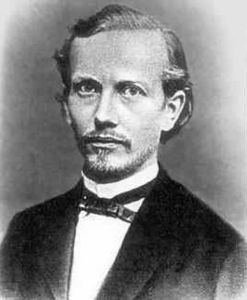
Hermann Hankel
Mathematician, Academic
1839 – 1873
Who was Hermann Hankel?
Hermann Hankel was a German mathematician who was born in Halle, Germany and died in Schramberg, Imperial Germany.
He studied and worked with, among others, Möbius, Riemann, Weierstrass and Kronecker.
His 1867 exposition on complex numbers and quaternions is particularly memorable. For example, Fischbein notes that he solved the problem of products of negative numbers by proving the following theorem: "The only multiplication in R which may be considered as an extension of the usual multiplication in R⁺ by respecting the law of distributivity to the left and the right is that which conforms to the rule of signs." Furthermore, Hankel draws attention to the linear algebra that Hermann Grassmann had developed in his Extension Theory in two publications. This attention was the first of many notations later made to Grassmann's early insights on the nature of space.
We need you!
Help us build the largest biographies collection on the web!
- Born
- Feb 14, 1839
Halle - Also known as
- Ганкель, Герман
- 赫尔曼·汉克尔
- Nationality
- Germany
- Profession
- Education
- Leipzig University
- Lived in
- Halle
- Died
- Aug 29, 1873
Schramberg
Submitted
on July 23, 2013
Citation
Use the citation below to add to a bibliography:
Style:MLAChicagoAPA
"Hermann Hankel." Biographies.net. STANDS4 LLC, 2024. Web. 1 May 2024. <https://www.biographies.net/people/en/hermann_hankel>.

Discuss this Hermann Hankel biography with the community:
Report Comment
We're doing our best to make sure our content is useful, accurate and safe.
If by any chance you spot an inappropriate comment while navigating through our website please use this form to let us know, and we'll take care of it shortly.
Attachment
You need to be logged in to favorite.
Log In